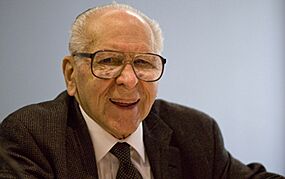Thomas Szasz facts for kids
Quick facts for kids
Thomas Szasz
|
|
|---|---|
| Szász Tamás István | |
 |
|
| Born |
Thomas Stephen Szasz
April 15, 1920 Budapest, Kingdom of Hungary
|
| Died | September 8, 2012 (aged 92) Manlius, New York, U.S.
|
| Citizenship | Hungary, United States |
| Alma mater | University of Cincinnati |
| Known for | Criticism of psychiatry |
| Spouse(s) | Rosine Loshkajian (m. 1951; died 1971) |
| Children | 2 |
| Awards | Award for Greatest Public Service Benefiting the Disadvantaged (1974), Martin Buber Award (1974), Humanist Laureate Award (1995), Great Lake Association of Clinical Medicine Patients' Rights Advocate Award (1995), American Psychological Association Rollo May Award (1998) |
| Scientific career | |
| Fields | Psychiatry |
| Institutions | State University of New York Upstate Medical University |
Thomas Stephen Szasz (/sɑːs/ SAHSS; Hungarian: Szász Tamás István [saːs]; 15 April 1920 – 8 September 2012) was a Hungarian-American academic and psychiatrist. He served for most of his career as professor of psychiatry at the State University of New York Upstate Medical University in Syracuse, New York. A distinguished lifetime fellow of the American Psychiatric Association and a life member of the American Psychoanalytic Association, he was best known as a social critic of the moral and scientific foundations of psychiatry, as what he saw as the social control aims of medicine in modern society, as well as scientism.
His books The Myth of Mental Illness (1961) and The Manufacture of Madness (1970) set out some of the arguments most associated with him.
Szasz argued throughout his career that mental illness is a metaphor for human problems in living, and that mental illnesses are not "illnesses" in the sense that physical illnesses are, and that except for a few identifiable brain diseases, there are "neither biological or chemical tests nor biopsy or necropsy findings for verifying DSM diagnoses."
Szasz maintained throughout his career that he was not anti-psychiatry but rather that he opposed coercive psychiatry. He was a staunch opponent of civil commitment and involuntary psychiatric treatment, but he believed in and practiced psychiatry and psychotherapy between consenting adults.
Contents
Life
Szasz was born to Jewish parents Gyula and Lily Szász on April 15, 1920, in Budapest, Hungary. In 1938, Szasz moved to the United States, where he attended the University of Cincinnati for his Bachelor of Science in physics, and received his M.D. from the same university in 1944. Szasz completed his residency requirement at the Cincinnati General Hospital, then worked at the Chicago Institute for Psychoanalysis from 1951 to 1956, and then for the next five years was a member of its staff – taking 24 months out for duty with the U.S. Naval Reserve.
In 1962, Szasz received a tenured position in medicine at the State University of New York. Szasz had first joined SUNY in 1956.
Szasz had two daughters. His wife, Rosine, died in 1971.
Szasz's views of psychiatry were influenced by the writings of Frigyes Karinthy.
Death
Thomas Szasz ended his own life on September 8, 2012 after suffering a painful spinal-compression fracture from a recent fall. Szasz had previously argued for the right to die in his writings.
Rise of Szasz's arguments
Szasz first presented his attack on "mental illness" as a legal term in 1958 in the Columbia Law Review. In his article he argued that mental illness was no more a fact bearing on a suspect's guilt than is possession by the devil.
In 1961, Szasz testified before a United States Senate Committee, arguing that using mental hospitals to incarcerate people defined as insane violated the general assumptions of the patient-doctor relationship, and turned the doctor into a warden and keeper of a prison.
Szasz's main arguments
Szasz was convinced there was a metaphorical character to mental disorders, and its uses in psychiatry were frequently injurious. He set himself a task to delegitimize legitimating agencies and authorities, and what he saw as their vast powers, enforced by psychiatrists and other mental health professionals, mental health laws, mental health courts, and mental health sentences.
Szasz was a critic of the influence of modern medicine on society, which he considered to be the secularization of religion's hold on humankind. Criticizing scientism, he targeted psychiatry in particular, underscoring its use of medical imagery and language to describe misbehavior, its reliance on involuntary mental hospitalization to protect society, and the use of lobotomy and other interventions to treat psychosis. To sum up his description of the political influence of medicine in modern societies imbued by faith in science, he declared:
As theocracy is rule by God or priests, and democracy is rule by the people or the majority, so pharmacracy is rule by medicine or physicians.
Szasz consistently paid attention to the power of language in the establishment and maintenance of the social order, both in small interpersonal and in wider social, economic, and/or political spheres.
Awards
Szasz was honored with over fifty awards including:
- American Humanist Association named him Humanist of the Year (1973)
- Award for Greatest Public Service Benefiting the Disadvantaged, an award given out annually by Jefferson Awards (1974)
- Martin Buber Award (1974)
- He was honored with an honorary doctorate in behavioral science at Universidad Francisco Marroquín (1979)
- Humanist Laureate Award (1995)
- Great Lake Association of Clinical Medicine Patients' Rights Advocate Award (1995)
- American Psychological Association Rollo May Award (1998)
Thomas S. Szasz Award
The Center for Independent Thought established the Thomas S. Szasz Award for Outstanding Contributions to the Cause of Civil Liberties.
Notable recipients
- Giorgio Antonucci
- Vladimir Bukovsky
- Henry Zvi Lothane
- Jeffrey Schaler
- Edward Snowden
- Jacob Sullum
- Phil Zimmermann
- Richard E. Vatz
See also
- Wrongful involuntary commitment
- Scientology front groups

